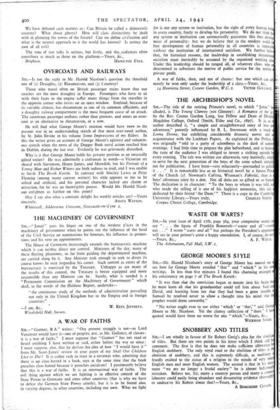OVERCOATS AND RAILWAYS
Sta,—Is not the teply to Mr. Harold Nicolson's question the threefold one of (1) Draughts, (2) Rheumatism, and (3) Courtesy?
Those who travel often on British passenger trains know that our coaches are the most draughty in Europe. Passengers who have to sit with their faces to the engine suffer many things from the traveller in the opposite corner who insists on an open window. England, because of its variable climate, has rheumatism as one of its common afflictions, and a draughty railway compartment is the most frequent cause of an attack. The courteous passenger endures rather than protests, and wears an over- coat as an alternative to rheumatism, or a row.
He will find what George Moore's reaction would have been to the present war in an understanding sketch of that most over-rated author, by St. John Ervine in his volume Some Impressions of my Elders. In this the writer gives an account of George Moore's agitated and volumin- ous speech when the news of the Dogger Bank naval action reached him in Dublin, during the last war. Evidently he was grievously disturbed.
Why is it that George Moore holds his present position as an unusually gifted writer? He was admittedly a craftsman in words—a Victorian art shared with Stevenson, Henry James, and Meredith, but his Portrait of a Young Man and Esther Waters are both tedious to read, and I was unable to finish The Brook Kerith. In contrast with Sinclair Lewis or Peter Fleming (among many current writers) his style appears to me to be stilted and artificial, and his personal character lacked any charm or attraction, for he was an incorrigible poseur. Would Mr. Harold Nicol- sqn enlighten us further on this point?
May I say also what a constant delight his weekly articles are?—Yours






















 Previous page
Previous page